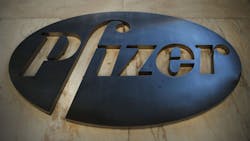Pfizer Needs New Rx for Growth as Allergan Deal Unravels
Pfizer Inc. has been thwarted for the second time in less than two years in its pursuit of a transformative, tax-powered deal to position the biggest U.S. drugmaker for long-term growth. The Obama administration has pretty much made sure there won’t be a third try.
Pfizer and Allergan Plc officially walked away from their $160 billion merger on Tuesday, an abrupt end to what would have been the largest deal in the pharmaceutical industry. It’s also a remarkable turning point in the white hot, election-cycle debate in the U.S. over corporate tax avoidance.
Pfizer’s planned mega-merger with Allergan was historic in scale and ambition. The deal would have burnished Pfizer’s drug portfolio and created a pharma giant, with a strong lineup ranging from advanced cancer treatments to generics. Yet it was also a tie-up designed to reap tons of tax savings. And if the new company were to establish itself abroad with a lower tax rate, a process often called an inversion, it would have been the largest ever such move.
Pfizer previously said it had strategic reasons for pursuing the acquisition, though it would also have helped the company escape the U.S.’s 35% tax rate, which applies to profits made anywhere in the world. In the proposed union, the new company would have been located in Ireland, enjoying a much lower local tax rate. Pfizer CEO Ian Read has long complained about what he believes is the competitive edge foreign rivals enjoy when it comes to taxes. That’s one reason Pfizer tried, and failed, to nail a tax-lowering inversion deal with British drugmaker AstraZeneca in 2014.
On Wednesday, AstraZeneca, Shire Plc and GlaxoSmithKline Plc rose on speculation that Pfizer sees the drugmakers as possible inversion targets. AstraZeneca gained as much as 2.6% in London, while Shire was up 2.9% and Glaxo 1.6%.
Since the Pfizer-Allergan deal was unveiled last November, the transaction has drawn withering criticism from Democratic and Republican presidential candidates, while Obama has called inversions the “most insidious of tax loopholes.” Then on Monday, the financial logic underpinning the merger collapsed when Obama administration proposed tougher-than-expected new rules aimed at making deals like the Pfizer-Allergan transaction much harder to achieve.
Lessons Learned
“There’s a couple lessons here: No. 1, don’t mess with the White House – they were very clear they didn’t want these transactions and broke new ground” with the new regulations, said John Schroer, sector head of health care at Allianz Global Investors, which holds Pfizer shares. “No. 2, inversions are dead.”
In the past decade, the main way that U.S. companies have inverted has been by acquiring a smaller company abroad that’s at least one-fourth their size. Monday’s proposed rule tightens that restriction by saying that if a foreign company has bulked up through mergers with other U.S. companies in the last three years, as Allergan has, that additional bulk isn’t counted toward its size.
Deal or no deal, Pfizer is still an industry leader with solid earnings and a strong balance sheet. Yet with tax inversions more difficult to pull off, Read and his management team need to come up with a fallback strategy to rejuvenate the company’s drug development pipeline. Allergan’s product lineup, including its anti-wrinkle treatment Botox, would have helped Pfizer cope with slower sales as former best-seller like Lipitor, a cholesterol fighter, have faced increased competition from generics.
“Is there a ‘plan B’ for Pfizer? If there is, it has not been articulated,” Bernstein analyst Tim Anderson wrote in a note to clients on Monday.
Possible Future Plans
In the past, Pfizer management has talked about the possibility of splitting up the company, possibly into two parts: one focused on new drug development, the other on selling older medications. It could revisit this idea, and Pfizer said Wednesday that it would decide on a possible separation by the end of this year.
Pfizer could also redouble its push to grow via smaller, strategic deals. Prior to inking the megadeal with Allergan, it bought Hospira Inc. for $17 billion, gaining an array of medicines and boosting its efforts to develop copies of biological drugs known as biosimilars.
“While a large transformative deal may not happen following the failed efforts” to pursue AstraZeneca and Allergan, “there are several small-mid size bio-pharma companies that PFE could potentially target in the coming months,” wrote Credit Suisse analyst Vamil Divan in a note to clients on Tuesday.
Neither of these routes would help reduce Pfizer’s tax rate. The U.S. has the highest tax rate for businesses in the world, at 35%, and is one of the only countries to tax corporate profits wherever they are earned. The Allergan deal would have put Pfizer’s tax rate at about 17%, according to the company.
“Basically, they missed the opportunity that would have been available a year ago,” said Schroer at Allianz.
Allergan is under less pressure than Pfizer to reinvent itself. CEO Brent Saunders is a serial dealmaker and “likely to lean toward M&A but wouldn’t face near term pressure to do so,” Bloomberg Intelligence analyst Elizabeth Krutoholow wrote in an e-mail.
Allergan will likely go ahead with a deal to sell its generics business to Teva Pharmaceutical Industries Ltd., which will give it about $33 billion in cash, allowing it to pay down debt or pursue more deals, she said. Teva said Wednesday that it is focused on completing the Allergan deal and the Treasury announcement will have no meaningful impact.
By Caroline Chen
About the Author
Bloomberg
Licensed content from Bloomberg, copyright 2016.
